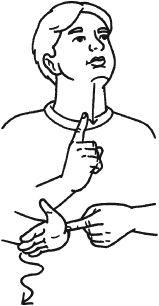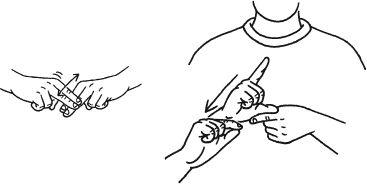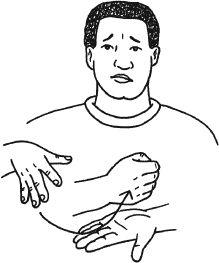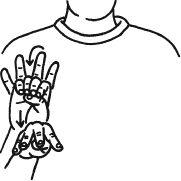Signing For Dummies (64 page)
Read Signing For Dummies Online
Authors: Adan R. Penilla,Angela Lee Taylor

Chapter 16: Ten Ways to Pick Up Sign Quickly
In This Chapter
Signing with your friends has never been so easy. You have natural Signs and gestures to make your point. You also have this book to add to what you already know. This chapter is short, but it gives you great ideas for some of the things you can do if you want to pick up ASL a little more quickly.
Volunteer at a Residential School for the Deaf
One way to immerse yourself into the Deaf world is to work at a residential school for the Deaf. Deaf culture is the way of life at these schools, and by being exposed to the culture, you become intimately familiar with Sign. You can volunteer in their after-school recreation programs or special-event preparations. Schools can never have too many volunteers to act as scorekeepers, coaches, assistants, ticket sellers, or in any other capacity that makes a program a success. By interacting with Deaf students, teachers, and parents, you’ll measurably improve both your expressive (signing to others) and receptive (reading others’ Signs) signing.
Volunteer at Local Deaf Clubs
Many Deaf people tend to congregate at their own clubs for a variety of reasons. They socialize, play pool, and watch TV, just to name a few activities. Many Deaf people bring their hearing children to these clubs, so that they can practice their signing and learn the ways of the Deaf culture. Some clubs even have photo albums of past members and guests. Deaf clubs also have fundraising events fairly often. Helping at one of these fundraisers is a great opportunity to practice signing while helping others at the same time. Volunteers are always needed to sell raffle tickets, take tickets during an event, keep score at games, or simply serve refreshments.
Attend Deaf Social Functions
Social functions are becoming more common since more Deaf people have started specialized organizations. These events can vary from sports activities to Deaf camp-outs to raffles. People interested in helping with flyers and tickets are always welcome. You can find out about functions in your community by checking the community pages in the phone book, looking on the Internet, or calling the local residential school for the Deaf if your community has one.
Make Deaf Friends
Having Deaf friends is really no different than having hearing friends. Many Deaf people enjoy sports, going shopping, and surfing the Internet. A Deaf friend can help you a lot with ASL. Just think carefully about your friendship, though. Deaf people are sharing a language and culture with you that they hold in high regard — please try to do the same.
Assist Deaf Ministries
Attending Deaf churches and ministries is a sure way to meet Deaf people. Watching religious interpreters in these settings keeps you on the cutting edge of Sign vocabulary. Some churches that have large Deaf ministries have programs set up for members of their congregation who wish to interpret for the Deaf. Church activities, such as picnics and Deaf Bible study groups, are enjoyable areas in which you could offer your assistance.
Attend Deaf Movies and Plays
Many local theaters have weekly plays, which include one night of an interpreted performance. In metropolitan areas, Deaf theaters have plays with all Deaf actors. Some larger cities also have movie nights featuring captioned subtitles. Many Deaf people attend these functions, so they’re great avenues for meeting different people and learning about Deaf culture.
Work at Camps for the Deaf
Working at a Deaf camp gives the novice Signer a relaxed atmosphere in which to work with Deaf children. Deaf camps are filled with games, hiking, and other good times. The new Signer has ample opportunity to interact with Deaf people from different areas and to encounter a variety of signing jargon and styles. You may even get the opportunity to see both adults and children perform stories in Sign. Who knows, during a week of camp you may even form new friendships that last long after camp has ended.
Attend Silent Weekends
Silent weekends aren’t as lengthy as Deaf camps. Beginning Signers who can’t miss time from work may find these weekends a perfect opportunity to mix with the Deaf community. These weekends vary as to how they’re run. Some furnish cabins that allow people to talk in the evenings, usually after 4 or 6 p.m., while others allow no talking at all. In fact, you may even be fined — 10 or 25 cents per infraction — if you’re caught talking at all. Entertainment is on hand, and an array of ASL teachers and interpreters are there to ensure that the weekend is filled with accurate Signing. You can obtain information about these silent weekends by going to
www.rid.org
. Each state has a chapter of the
Registry of Interpreters for the Deaf (RID).
Click on your state’s link for information.
Go to Deaf Workshops and Conferences
Many Deaf organizations exist, and one in particular is the
National Association of the Deaf
(NAD). Workshops and conferences take place through these organizations and offer a myriad of subjects — something to interest everyone. One popular subject is Sign itself. Many educators and veteran interpreters regularly present poetry in Sign or give in-depth analyses of particular properties of Sign. Attending one of these workshops may give a beginning Signer a new insight on Deaf aspects.
Watch Sign Language Videos
Videos are a sure way to get your Signing where you want to take it. Many companies specialize in Sign Language materials and will be happy to send you their catalogs. Get together with a Deaf friend, grab a catalog, and let your friend help you decide which videos would be good to learn from based on your particular level of ability. The best way to find sources of these types of videos is to surf the Net. Just enter the words “sign language” into your search engine and watch how many sites come up. Your local library is also a good source for videos — you can often borrow them free of charge. Although books are a big help, videos not only demonstrate three-dimensional Signing but also can be rewound and viewed at a slower-than-normal speed. Besides, viewing one of these videos with a friend can be a lot of fun.
Chapter 17: Ten Popular Deaf Expressions
In This Chapter
Expressing ASL expressions
Understanding when to use them
ASL uses expressions in much the same way that English does. This chapter describes some that are commonly used in Sign. As a helpful hint, practice these expressions with people who’ve been signing for a while. This can be a shortcut to your success.
Some of the following Signs have an exact English equivalent, and some don’t. The ones that don’t, however, are quite similar to an English expression.
Swallowed the fish
The idea behind this idiom is right up there with the word
gullible.
You can sign it about yourself or another person. You use it in good humor after someone has mistakenly placed his trust in someone he shouldn’t have.

Train gone
You don’t normally direct this light-hearted idiom toward yourself, but rather toward someone else. This Sign, which can be compared to the English idiom “missed the boat” is often used when someone tells a joke and everyone is laughing but one person, or when one person wants something repeated that everyone else managed to understand the first time. At these times, someone will look at that person, smile, and sign TRAIN GONE. The facial expression for this Sign may be puffed cheeks (imitating a smokestack) or just a blank stare, whichever you prefer. Either way, everyone will know that someone didn’t catch the information.

Pea brain
Hearing people use this idiom as well, but just as with English, this is one idiom that you shouldn’t use very often because it’s not polite. In fact, it’s somewhat offensive, although perhaps in a group of good friends you can get away with it if you mean it in good fun. The facial expression that accompanies this Sign determines the degree of meaning or, in this case, maybe the size of one’s brain! Sticking your flattened tongue out while signing PEA BRAIN makes it pretty clear as to what you mean. What’s even meaner is crossing your eyes while you’re doing it. So as a general rule, save it for people you know really well.

Shucks/Darn!
Make this expression when something didn’t go as expected. If you’ve ever experienced this situation, you’ll probably already know how it’s used. Like the illustration indicates, you open your passive hand facing up and, using your dominant hand, start with the manual number 5 and with the manual letter S act like you’re catching a fly in the palm of your hand.

Cross fingers on both hands
Crossing your fingers on both hands is an expression that means
I hope;
it’s pretty simplistic and is generally understood in both the hearing and Deaf worlds alike.
Your guess is as good as mine
Again, this Sign is used in English, too. And, as in English, it’s only used after someone asks a question. However, in Sign, you can ask a question and use this expression at the same time. A good facial expression to go with it is to smirk (smiling with just the corner of your mouth) and raise your eyebrows. Another way to emphasize this expression is to make the size of the Sign bigger. Doing so tells whomever you’re signing to that you really don’t have any idea whatsoever.

Cool!
You can sign this expression in one of two ways; both have the same meaning but in different degrees. You use it in response to something communicated to you by another person. Be sure to make the Sign on your chest, leaving your facial expression fully visible — that’s where the difference is. Forming an “ooh” shape with your mouth means
really cool.
Opening your mouth wide can mean
a surprised cool.

5 to manual S under chin
Make this Sign when you witness or express an embarrassing action. Open your eyes wide; you can even put on a nervous smile as you express it. This Sign is done with the manual 5 palm facing the Signer and is closed to make the manual S — it signifies a lump in your throat.

